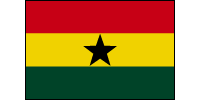| Country (long form) |
Republic of Ghana |
| Capital |
Accra |
| Total Area |
92,100.81 sq mi
238,540.00 sq km
(slightly smaller than Oregon) |
| Population |
19,894,014 (July 2001 est.)
note: estimates for this country explicitly take into account the effects of excess mortality due to AIDS; this can result in lower life expectancy, higher infant mortality and death rates, lower population and growth rates, and changes in the distribution of population by age and sex than would otherwise be expected |
| Estimated Population in 2050 |
31,952,685 |
| Languages |
English (official), African languages (including Akan, Moshi-Dagomba, Ewe, and Ga) |
| Literacy |
64.5% total, 75.9% male, 53.5% female (1995 est.) |
| Religions |
indigenous beliefs 38%, Muslim 30%, Christian 24%, other 8% |
| Life Expectancy |
55.86 male, 58.66 female (2001 est.) |
| Government Type |
constitutional democracy |
| Currency |
1 new cedi (C) = 100 pesewas |
| GDP (per capita) |
$1,900 (2000 est.) |
| Industry |
mining, lumbering, light manufacturing, aluminum smelting, food processing |
| Agriculture |
cocoa, rice, coffee, cassava (tapioca), peanuts, corn, shea nuts, bananas; timber |
| Arable Land |
12% |
| Natural Resources |
gold, cocoa, timber, tuna, bauxite, aluminum, manganese ore, diamonds |
|


|